Regularly consuming carrots or carrot juice benefits the body in so many amazing ways. Here are some great reasons to include this superfood vegetable in your diet:
 1. Protects Eye Health
1. Protects Eye Health
Three crucial nutrients — beta carotene, lutein and zeaxanthin — within carrots considerably boost eye health. For example, without beta carotene (a form of vitamin A), various forms of eye disorders can occur — including macular degeneration and even blindness. Lutein and zeaxanthin, meanwhile, both work to reduce the risk of age-related vision loss.
Just one cup of chopped carrots provides 400% of your vitamin A needs! Carrots contain vitamin A in the form of beta carotene. Vitamin A is one of the most crucial nutrients necessary for protecting eye health and vision, especially as someone ages.
Vitamin A deficiency can lead first to night blindness, then permanent blindness. Vitamin A deficiency is actually the number one cause of preventable blindness world-wide. Carrots can also reduce your risk of cataracts and macular-degeneration, a common cause of age-related vision loss. (2)
Eating carrots carrot juice regularly will help you maintain healthy eyes and vision throughout your life. If consuming carrots in raw form does not appeal to you, bear in mind that drinking carrot juice carries over the same eye health benefits.
2. High Source of Antioxidants (Especially Beta Carotene)
Carotenoids, found in carrots and other orange vegetables, are potent antioxidants that can help reduce your risk of various forms of temporary illnesses and serious chronic diseases. Carrots and carrot juice benefit the immune system by helping to defend the body from free radical damage, harmful bacteria, viruses and inflammation.
The antioxidants that are responsible for carrot and carrot juice benefits include: vitamin C, beta carotene, lycopene, lutein, zeaxanthin. Carrots are one of the highest natural sources of carotenoid phytochemicals and antioxidant beta carotene,both of which fight cancer by stopping DNA damage, levels of inflammation and cell mutation. (3)

3. Decreases Risk for Heart Disease and Stroke
Eating more deeply colored orange vegetables like carrots decreases the risk ofcardiovascular disease, especially in adult women. Regardless of other cardiovascular risks, current research indicates that drinking carrot juice benefits heart health by lowering oxidative stress and improves the body’s defense against various forms of cardiovascular disease. (4)
This effect is likely due to the high antioxidant content that carrots contain. Carrots also work to lower cholesterol, and boost bile production, which increases the body’s ability to digest fat. This not only helps your digestive system to properly absorb nutrition from your food, but also directly impacts the good cholesterol levels in your body — which protects your heart. (5)

4. Helps Protect Against Cancer
Evidence suggests that consuming high levels of carotenoids from fruits and vegetables can be protective in relation to cancer recurrence. Studies show that these antioxidants in carrots may be able to fight leukemia cells and may play a role in reducing your risk of some of the most widespread types of cancers, including ovarian and breast cancer. (6, 7)
One study observed the effects of women with a history of breast cancer consuming eight ounces of fresh orange juice and carrot juice daily for a three-week period.
These results showed that daily intake of fresh carrot juice benefited the body’s defenses against cancer and was an effective approach to increasing levels of protective antioxidant carotenoids in the blood. This, in turn, reduced oxidative stress and inflammation, both of which protect against cancer growth. (8)

5. Important for Maintaining Oral Health
The nutrients found in carrots help improve immunity, including the body’s ability to fight bacteria and toxins that enter through the mouth and live within the gums and teeth. Certain minerals in carrots can be antibacterial and help prevent cavities and tooth decay. (9) Carrots can also help remove plaque and stains from teeth if eaten after meals. Once eaten, the fiber in carrots also boosts immunity by acting as a natural digestive system brush, scrubbing away unwanted bacteria in the gut and promoting better digestion of immune-boosting nutrients.
6. Boosts Skin Health and Wound Healing
Beta carotene is critical for healing any type of wound. Carrots have even been used as a poultice to help heal wounds for centuries due to their high beta carotene content. (10) If you have any type of skin infection, cuts, or other wounds, you’ll find that carrots and carrot juice benefits your skin health by increasing your ability to heal faster and to fight infection and noticeable signs of skin inflammation.

7. Protects Brain Health & Cognitive Function
Carrots and carrot juice benefits brain health by helping to prevent against Alzheimer’s disease, improving memory, and defending against other types of cognitive decline. This is due to carrot’s ability to lower oxidative stress in the brain that can weaken nerve signaling capacity. (11)
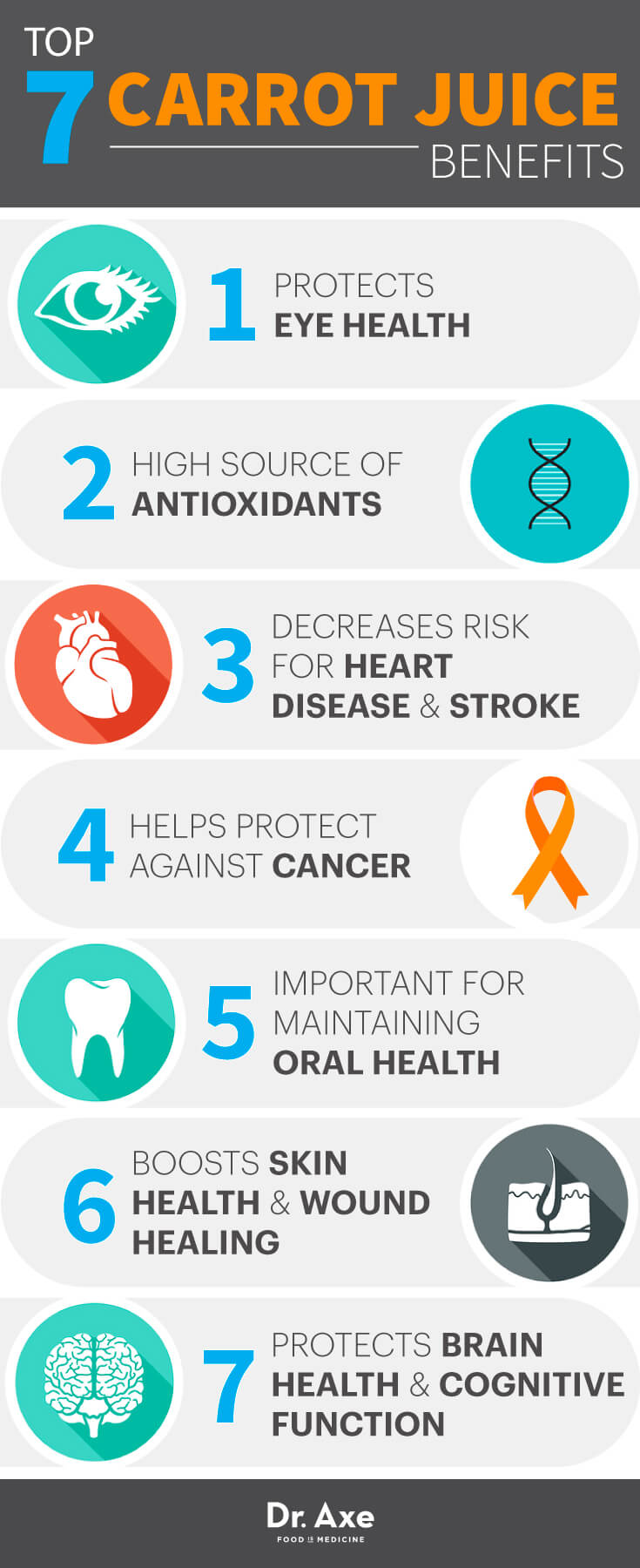
Carrot History
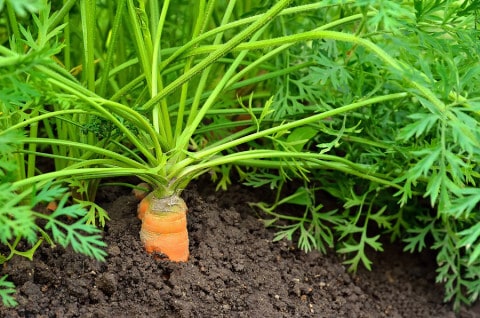
Carrots are considered to be one of the most important cultivated vegetable crops in history. They have been providing nutrients to populations for thousands of years, with records showing that the first modern-day carrot varieties were consumed around the 10th Century in parts of the Middle East and Asia.
Even before that time, many types of wild carrots (some sources say 80 different kinds) were eaten in countries like Persia, Turkey, Iran and areas in the Asia Minor.
Today there are two main types of cultivated carrots: Eastern/Asiatic carrots (which are often called anthocyanin carrots because of their purple roots) and Western carrots (which are orange colored and are sometimes called carotene carrots).
Eastern carrots are usually found in Afghanistan, Russia, Iran and India, while Western carrots are found in Europe, North, and South America. Both types belong to the species Daucus carota and offer similar health benefits. Compared to carrots that were grown thousands of years ago, modern day carrots are thought to be sweeter, more attractive in appearance, and better able to defend themselves from pests and bugs while growing. (12)
Some people avoid carrots because they believe they are high in sugar and will raise blood glucose. However this is far from the truth; one cup of raw carrots contains only about 10 grams of carbohydrate and almost 4 grams of fiber. The fiber in carrots helps to slow down the release of sugars, in the form of glucose, into the blood stream.
Including carrots in a healthy diet can even be safe for someone who has diabetes because carrots prevent any drastic increases in blood sugar. However diabetics, or anyone else who may have trouble balancing blood sugar levels, should limit their consumption of carrot juice as juicing carrots can concentrate the sugar in the vegetable because this process removes the protective fiber.
How to Buy Carrots
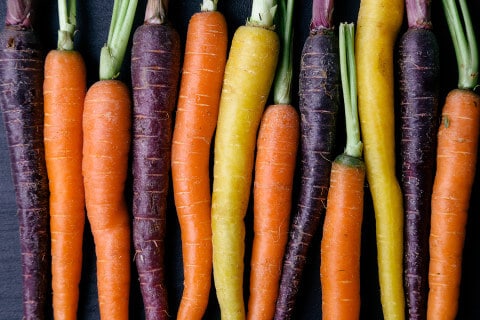
It is best to consume whole, organic carrots if possible. Baby carrots are usually washed in chlorine before packaging, therefore they should not be your first choice when it comes to carrots. Instead try eating carrots whole instead, or juicing carrots.
Aside from buying orange carrots, also look for multi-colored organic, heirloom carrots as they can be a very sweet and a delicious treat. You do not need to peel the carrots, as many of the nutrients and fiber are found in the skin. Just use a strong brush to wash the carrots and remove any dirt and debris.
I recommend buying carrots that are grown organically whenever possible, especially when you are using them to make carrot juice. Root crops, such as carrots, grow in the soil and are able to absorb whatever toxins and pesticides are present in the soil.
When you make carrot juice you are consuming a high amount of carrots at one time; this means that if toxins are present, you will also be ingesting a high level of these chemicals which can diminish the carrot juice benefits you’re looking for.
According to sources, residual levels of toxic pesticides are found at much higher levels in conventionally grown carrots than in organic carrots and out of the top 48 most popular fruits and vegetables, the Environmental Working Group lists carrots as the 22ndmost contaminated. (13, 14) Therefore to get the most carrot and carrot juice benefits without consuming a high level of toxins, always try to buy organically grown carrots.
Ways to Enjoy Carrots
If you want to include carrots in your diet, I recommend eating them in a variety of ways for the most benefits.
RAW
The fiber content of carrots may be higher in raw carrots since it is not broken down through cooking. Raw carrots can be a great snack, so pack a few in a plastic bag to take with you to work.
COOKED
Eating cooked carrots in addition to raw carrots used in carrot juice is also important, as some research has found that cooked carrots may have higher antioxidant activity than raw carrots. Balance carrot juice out with other vegetable juices that are lower in carbohydrates. Add carrots to soups, stews, or just lightly cook them in coconut oil for a delicious side dish.
JUICED
Juicing is a great way to include carrots in your diet, but don’t overdo it as juicing carrots removes the fiber and can increase the sugar content.
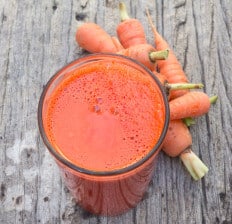
Benefits of Juicing
One of the biggest reasons people avoid eating a high amount of vegetables is that they are short on time. If you don’t have much time to cook and don’t always have the ability to prepare a fresh salad or another recipe using carrots, fresh carrot juice can be a great option.
1. Concentrated Nutrition
Juicing fruits and vegetables to get the most live enzymes and all the concentrated nutritional benefits has become more popular over recent years, and juicing carrots is no exception. As people have learned more about carrot juice benefits, carrots have become one of the most loved additions to any homemade juice.
2. Health Benefits
Carrot juice benefits your overall health when you consume it regularly because it can add many life-enhancing micronutrients to your diet easily, in a fast and more efficient way.
Regularly drinking vegetable carrot juice benefits immunity, energy levels, and digestion. It may also be able to help with weight loss due to resolving underlying nutrient deficient that may lead someone to overeat, as their body searches for more micronutrients.
3. Eases Digestion
Juicing carrots and other vegetables can also help the digestive tract to absorb nutrients more easily, since the vegetable’s fibers are already broken down and less work needs to be done by the body to unleash vitamins and minerals. This is important considering the fact that many people have compromised digestive abilities and digestive disorders like irritable bowel syndrome (IBS), due to years of eating a poor diet that stresses the digestive system.
Most high-quality juicers break down vegetables to the point that their nutrients are somewhat “pre-digested”. This means that once the nutrients enter your stomach, they are absorbed into the blood stream quickly and with less stress put on your stomach, intestines, liver and other digestive organs.
Carrot Juice Recipe
You can either make carrot juice in a high speed blender or in a juicer. Using about 3 large carrots will result in about 8 oz. of carrot juice, which is about 1 serving.
- Wash your carrots and peel them if you’d like to (although this isn’t necessary and the skin actually does contain important nutrients). You can also just cut away any dirt bits on the skin if you’d like.
- Cut the carrots into smaller pieces, about 2-3 inches long, which makes them more manageable for a blender or juicer.
- If you’re using a blender, place all ingredients in the blender and blend until smooth, adding a splash of water or fresh squeezed orange or apple juice if needed to get the blender moving.
- Then, place a fine mesh strainer over a large bowl and pour the juice over, straining any fibrous bits. This won’t be necessary if you use a juicer.
- Discard the strained pulp and pour your juice into a serving glass. Or you can keep the strained pulp and mix it in to muffins or bread for added nutrition!
- You can always add more cold water, since the amount of juice you have will be relatively small. Serve cold ideally right away.
To add even more flavor to carrot juice, try combining it with other ingredients that enhance the taste of carrots. For example, this Orange Carrot Ginger Juice recipe features other nutrient dense foods that further help the body boost immunity and improve energy.
Orange Carrot Ginger Juice Recipe
Total Time: 5 minutes
Serves: 2
INGREDIENTS:
- 6 carrots
- 1 orange
- 1 knob of ginger
- 1 cucumber
DIRECTIONS:
- Add all ingredients to vegetable juicer. Gently stir juice and consume immediately.
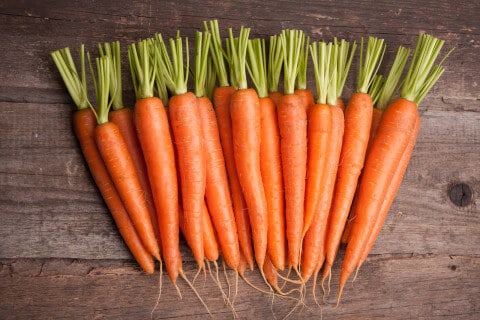
No comments:
Post a Comment